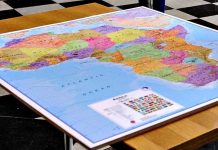Africa-Press – Lesotho. Lesotho, a small, landlocked country in Southern Africa, is grappling with the challenge of balancing economic growth and environmental sustainability in its energy market.
The nation, which is entirely surrounded by South Africa, has a population of just over 2 million people and a predominantly rural economy based on agriculture, livestock, and small-scale industries.
Despite its modest size and limited natural resources, Lesotho has ambitious plans to develop its energy sector and become a significant player in the regional market.
One of the key drivers of Lesotho’s energy strategy is the need to reduce its dependence on imported electricity from South Africa. Currently, the country imports over 90% of its power from its neighbor, making it vulnerable to supply disruptions and price fluctuations.
To address this issue, the government has set a target of generating at least 80% of its electricity from renewable sources by 2030. This includes harnessing the country’s abundant water resources to expand hydropower capacity, as well as exploring the potential of solar and wind energy.
The centerpiece of Lesotho’s renewable energy plans is the Lesotho Highlands Water Project (LHWP), a massive infrastructure initiative that aims to harness the power of the Senqu/Orange River system to generate electricity and supply water to South Africa.
The project, which is being developed in phases, has already resulted in the construction of two major dams and a hydropower plant, with more facilities planned for the future.
Once completed, the LHWP is expected to significantly boost Lesotho’s energy production and contribute to regional energy security. However, the pursuit of economic growth through energy development is not without its challenges.
Lesotho’s rugged terrain and limited infrastructure make it difficult to build and maintain large-scale energy projects, while the country’s small domestic market and limited access to external financing constrain investment in the sector.
Moreover, the environmental and social impacts of energy projects, particularly large dams, have raised concerns among local communities and international observers.
To address these challenges, the government of Lesotho has adopted a multi-pronged approach that seeks to balance the need for economic development with the imperative of environmental sustainability.
This includes promoting small-scale, decentralized energy solutions such as mini-hydro, solar, and biogas systems, which can be more easily integrated into local communities and have a lower environmental footprint.
The government has also established a regulatory framework for the energy sector, including the creation of an independent energy regulator and the adoption of environmental and social safeguards for energy projects.
In addition, Lesotho is actively seeking to diversify its energy mix and reduce its reliance on hydropower, which is vulnerable to the impacts of climate change and water scarcity. This includes exploring the potential of solar and wind energy, as well as investing in energy efficiency and demand-side management measures.
The government has also set a target of increasing the share of renewable energy in the country’s total energy consumption to 50% by 2030, in line with the United Nations Sustainable Development Goals.
As Lesotho moves forward with its energy development plans, it faces a delicate balancing act between the need to stimulate economic growth and the imperative of preserving its unique environment and cultural heritage.
By adopting a comprehensive and forward-looking approach to energy planning, the country has the opportunity to not only secure its energy future but also serve as a model for sustainable development in the region.
The success of Lesotho’s energy market will ultimately depend on its ability to navigate these competing priorities and forge a path that is both economically viable and environmentally responsible.
For More News And Analysis About Lesotho Follow Africa-Press






